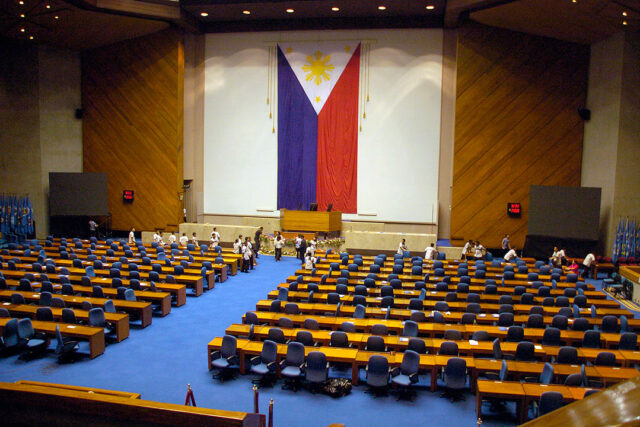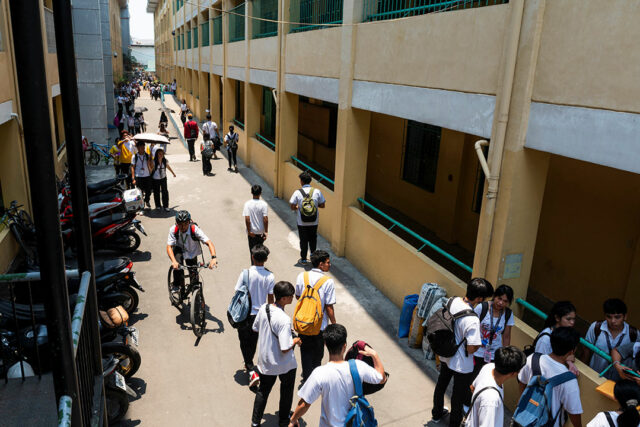By Kenneth Christiane L. Basilio and Kyle Aristophere T. Atienza, Reporters
PRESIDENT Ferdinand R. Marcos, Jr. should veto the budget bill approved by Congress as it may be in violation of the 1987 Philippine Constitution and various laws, analysts said over the weekend.
“The veto must apply to the whole budget. The PhilHealth problem is inextricably connected to the corruption or bastardization of the whole budget,” Filomeno S. Sta. Ana III, coordinator of Action for Economic Reforms, said in a Viber message. “The whole budget violates several laws and ultimately, the Constitution.”
Their decision to cut the proposed P74-billion subsidy for the Philippine Health Insurance Corp.’s (PhilHealth) for next year violated the 2019 Universal Healthcare Act and the 2012 Sin Tax Reform Law, according to Mr. Sta. Ana.
“Mr. Marcos must immediately order Congress to legislate a new budget bill. Ensure that the budget for PhilHealth will cover the correct premiums of all indirect contributors and restore the budget cuts that Congress did to essential services like education,” he added.
Mr. Sta. Ana was referring to the P10-billion budget cut made to the education sector and funding for the Public Works department that led to a 29.7% increase to P1.1 trillion.
This dwarfed the total allocations for the education sector with the Education department’s budget inching down by 1.47% to P737 billion from P748 billion. The Commission on Higher Education was allocated P33.3 billion from P60.2 billion, while state universities and colleges were given P122 billion from P114 billion, initially.
The budget of the Technical Education and Skills Development Authority was not indicated in the bicameral conference committee report of the budget, a copy of the approved committee report of the budget bill showed.
The Philippine Constitution states that the education sector should receive the “highest budgetary priority.”
“The 1987 Constitution mandates… that the State should give priority to education,” National Union of Peoples’ Lawyers President Ephraim B. Cortez said in a Viber message.
“Taken from this perspective, this imposes a duty on the government to prioritize education in its plans and therefore should also be given priority in the allocation of the budget,” he added. “From this point… giving a higher budget to public works is unconstitutional.”
The Office of Party-list Rep. Elizaldy S. Co, who heads the House appropriations committee, did not immediately respond to a Viber message seeking comment. Marikina Rep. Stella Luz A. Quimbo and Party-list Rep. Raul Angelo D. Bongalon, members of the House contingent for the 2025 budget bill’s joint panel, have also yet to respond to Viber message.
Mr. Cortez, however, said in a Viber message that while the Philippine president is vested with the power to veto any measures passed by Congress, the said authority is limited to vetoing specific line-items within budget bills.
“The Constitution is silent as to whether he can veto an appropriations bill in its entirety. Though he has a general veto power, this particular provision in the Constitution, the line-item veto, is made specifically applicable to an appropriations bill,” he said.
A general veto of the budget bill would result in the reenactment of the 2024 spending plan, according to Hansley A. Juliano, who teaches political science at the Ateneo de Manila University.
“A veto simply means the reuse of the 2024 budget. We have built in structures to ensure the government never shuts down.”
Senator Mary Grace Natividad S. Poe-Llamanzares, who led the Senate contingent of the Bicameral Conference Committee, had explained last week that PhilHealth could tap P600 billion in its reserve funds.
Advocates have however flagged PhilHealth’s fiscal health as its reserve fund is not enough to shoulder projected liabilities beyond two years, urging the President to return the budget to Congress.
“The President can return the budget to Congress and ask for funding for PhilHealth and while at that, fix the national budget to reflect the national agenda of prioritizing education and health,” said former Finance Undersecretary Cielo D. Magno, who teaches at the University of the Philippines School of Economics.
The post-dictatorship 1987 Constitution gives the President the power to exercise line-item veto in an appropriation, revenue, or tariff bill “but the veto shall not affect the item or items to which he does not object.”
But Congress may reconsider the veto by a vote of two-thirds of all the members of the House.
Health advocate Anthony C. Leachon, who advised the Department of Health during the pandemic, said removing the government’s subsidy for PhilHealth would violate the Sin Tax Law and the Universal Health Care law “since lawmakers have not allocated funds to reduce the out-of-pocket expenses of Filipino patients.”
The Sin Tax Reform Acts of 2012 and 2019 mandated the government to allocate 80% of revenues from tobacco products and sugar-sweetened beverages for PhilHealth to fund the country’s universal health care program.
“If the President signs the proposed budget, he will go down in history as one of the misinformed presidents who don’t value the health of the people,” he said in an X message.
Failing to cure the contentious budget will “push us again in the dark ages begging for funds from politicians” through dole-outs, he added, citing substantial increases in the cash subsidy programs of the Department of Social and Welfare Development and the Department of Labor and Employment.
Financial expert Enrico P. Villanueva, who teaches money and banking at the University of the Philippines Los Baños, said while PhilHealth may have enough reserve fund to pay for net expenses for two years, “its reserve fund is way below the required provision for projected liabilities beyond two years.”
“PhilHealth has passed on reserve deficiency to the members and charged it against members’ equity,” he said in an X message.
“So paying members are already paying for the mismanagement of the fund. Member’s equity is in fact already negative, rendering PhilHealth as a balance sheet insolvent, with member’s effectively thrust into debt.”
Section 11 of the Universal Health Care Act of 2019 mandated Philhealth to have a reserve fund enough to cover their operations for two years, Ms. Magno also noted.
The law ordered the agency to use its excess reserve fund to enhance program benefits for and reduce the contributions of its members.
In its Statements of Changes in Equity, as of December 31, 2023, PhilHealth booked a reserved fund of P464.2 million.
Its provision for insurance contract liabilities stood at P1.127 trillion, while its total members’ equity reached P663.7 billion.
The agency logged P89.9 billion in unused subsidies in the past three years, P38.8 billion of which was in 2023 and P24 billion in 2022.
“If you look at the financial documents of PhilHealth, if we consider its insurance contract liability, we can see that the fiscal position of PhilHealth is actually negative,” Ms. Magno said.
The health insurer transferred P20 billion and P10 billion of its unused funds to the Bureau of the Treasury on May 10 and Aug. 21, respectively, in compliance with a Department of Finance circular.
The move is now challenged by members of civil society and former government officials before the Supreme Court.
“Reserves are not surpluses. Reserves are contingent funds needed to provide for expanded healthcare services,” Mr. Leachon said. “Any preneed fund manager knows that a fund must always be larger than current demand.”
“The fund transfer out of PhilHealth this year and the non-payment by the government of PhilHealth subsidy for the non-paying members weakens not only the cash position of PhilHealth but also its reserve level and equity. In computing the insurance reserves, PhilHealth assumes government subsidy,” Mr. Villanueva said.
“Taking the subsidy away increases the required provision for liabilities. The government, unintentionally or deliberately, is screwing the corporation and the Filipino people several times over,” he added.











